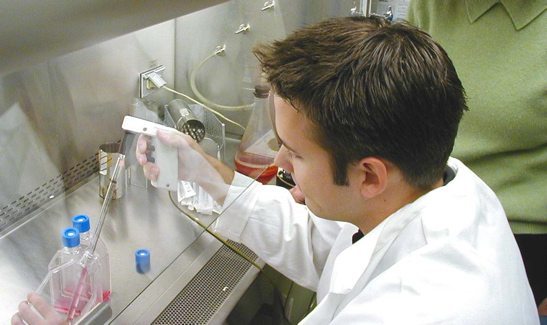While scientists at the Phoenix-based Translational Genomics Research Institute (TGen) investigate diseases of the brain and heart, as well as deadly pathogens, most of the nonprofit biomedical institute’s research is devoted to seeking the genetic causes of cancer.
TGen’s central goal is to discover which genes within our 3-billion-base DNA either protect us from cancer or allow cancers to form.
This year, TGen has been involved in two cancer research initiatives that have potentially far-reaching implications.
In May, Stand Up to Cancer awarded an $18-million grant to TGen and the University of Pennsylvania. Dr. Daniel Von Hoff, TGen’s physician-in-chief, and Dr. Craig B. Thompson, director of the Abramson Cancer Center at the University of Pennsylvania, will lead a three-year investigation into new approaches in treating pancreatic cancer, the fourth-leading cause of cancer death in the United States.
In April, a study sponsored by TGen, Scottsdale Healthcare and Caris Dx showed that molecular profiling of patients can identify specific treatments for individuals, helping to keep their cancer in check for significantly longer periods and in some cases even shrink tumors. Von Hoff, the study’s principal investigator, released the study’s results at the 100th annual meeting of the American Association for Cancer Research in Denver.
TGen this year also has made major headlines on a monthly basis following other discoveries and partnerships that could lead to new treatments for cancer patients.
In August, Dr. Glen Weiss, who works for TGen and Scottsdale Healthcare, announced two significant advances in treating lung cancer. Weiss, an associate investigator in TGen’s cancer and cell biology division and director of thoracic oncology at TGen Clinical Research Services at Scottsdale Healthcare, made both announcements at the 13th World Conference on Lung Cancer in San Francisco. In one presentation, Weiss described research that eventually could help prevent lung cancer from spreading to the brain. In the second presentation, Weiss discussed the results of phase I clinical trials for a drug called TH-302 developed by Threshold Pharmaceuticals. The trials, conducted at the Virginia G. Piper Cancer Center at Scottsdale Healthcare, found that 75 percent of patients with small cell lung cancer who were treated only with TH-302 “achieved stable disease or better.” The trials also found that 67 percent of patients with non-small cell lung cancer who were treated with a combination of TH-302 and other chemotherapy agents “achieved stable disease or better.”
In July, an international scientific team led by TGen received a $1 million grant from the Melanoma Research Alliance to study skin cancer. The team, led by Dr. Jeffrey Trent, TGen’s president and research director, will conduct a two-year study called, Identification of Novel Melanoma Risk Genes Using High-Throughput Genomics.
Also in July, California and Arizona researchers identified a gene variant that carries nearly twice the risk of developing an increasingly common type of blood cancer, according to a study published by the science journal, Nature Genetics. Investigators at the University of California, Berkeley and at TGen found that mutations in a gene called C6orf15, or STG, are associated with the risk of developing follicular lymphoma. This is a cancer of the body’s disease-fighting network and has an incidence rate that has nearly doubled in the past three decades.
In May, the opening of a new breast health center next to John C. Lincoln Deer Valley Hospital provided significant new research opportunities for TGen. The 9,000-square-foot Breast Health and Research Center includes a tumor biorepository for TGen that will aid the research institute in discovering new ways to diagnose and treat breast cancer, which affects one in every eight American women.
In April, TGen researchers announced they might have found a way to stop the often rapid spread of deadly brain tumors. One gene, named NHERF-1, may be a serious target for drugs that could prevent malignant tumors from rapidly multiplying and invading other parts of the brain, according to a cover story in Neoplasia, an international journal of cancer research.
In February, TGen and the Van Andel Research Institute (VARI) announced they would forge a strategic alliance to enable both to maximize their worldwide contributions to science and health. The partnership between TGen and the Grand Rapids, Mich.-based VARI will enable both institutes to speed up their mutual goals of moving research discoveries about cancer and other debilitating medical conditions from laboratories to patient care as quickly as possible.
TGen’s efforts are also international. The institute is partnering with the small European country of Luxembourg to help develop the Integrated Biobank of Luxembourg (IBBL). In addition, TGen is part of the first IBBL demonstration project, Luxembourg Project Lung Cancer, in collaboration with the Partnership for Personalized Medicine.
Steve Yozwiak is a senior science writer at TGen, www.tgen.org.




